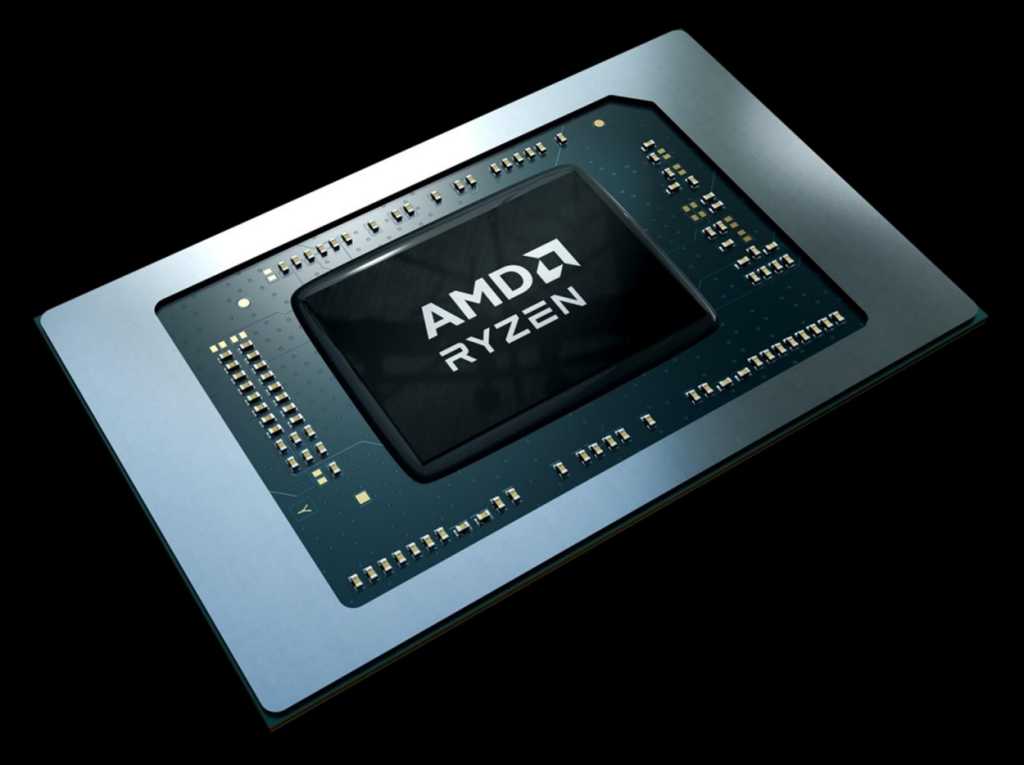Turnabout is fair play: At CES 2024, AMD launched desktop versions of its mobile Ryzen 8000 processors, bringing AI to the desktop alongside integrated graphics. And for AMD fans who aren’t quite ready to make the leap to AMD’s AM5 socket, whoa! There are new Ryzen 5000 desktop chips as well.
AMD’s launch adds four new Ryzen 8000 G-series processors to AMD’s lineup. These are APUs, AMD’s desktop chips that combine integrated graphics alongside the CPU die — in this case, the RDNA 3- based Radeon 780M, Radeon 760M, and Radeon 740M that we saw integrated in the AMD Ryzen 8040 (8000) series chips AMD announced this December. All of the new Ryzen 8000 and 5000 chips will be available on Jan. 31.
Ryzen 8000: Bringing Ryzen AI to the desktop
AMD is launching four members of the Ryzen 8000 G-series family, one of which will only be available in a partner system, rather than in its own standalone box. All of these new chips use the AM5 socket. These new desktop parts are also all 65W, just a bit higher than the 35W to 54W parts at the top of the mobile Ryzen 8000 stack.
- AMD Ryzen 8700G: 8 cores/16 threads, 5.1GHz turbo, Radeon 780M integrated graphics, Ryzen AI: $329
- AMD Ryzen 8600G: 6 cores/12 threads, 5.0GHz turbo, Radeon 760M integrated graphics, Ryzen AI: $279
- AMD Ryzen 8500G: 6 cores/12 threads, 5.0GHZ turbo, Radeon 740M integrated graphics: $179
- AMD Ryzen 8400G: 4 cores/8 threads, 4.9GHz turbo, Radeon 740M integrated graphics
AMD
As of now, AMD is not releasing prices for all of the new Ryzen 8000 series processors, just most of them. The Ryzen 8400G will only be available to system builders, AMD said.
We’ve known that AMD’s mobile graphics are powerful, and for years the company has pitched its APUs as more potent than Intel’s own Iris integrated graphics processors. AMD is making an interesting argument: that its latest chips are about as powerful as a slightly older Core i5-13400F and a (very) old Nvidia GeForce 1650 discrete GPU. The games are being run at 1080p, but at low detail, AMD said.
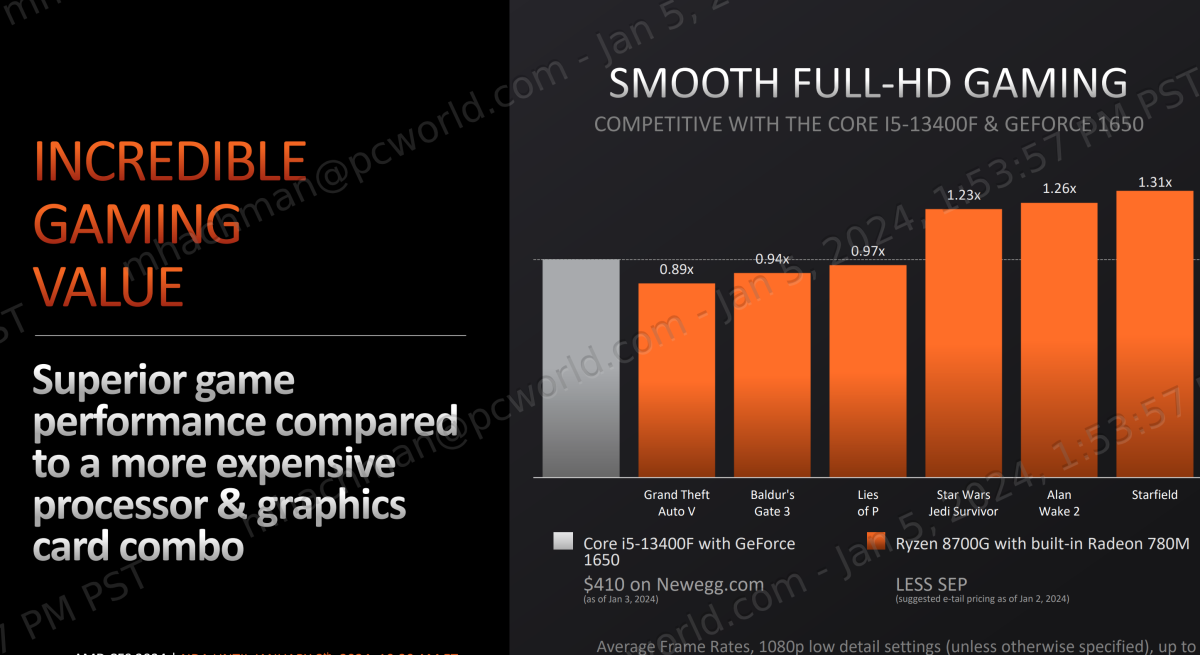
AMD
AMD is also making the claim that the new Ryzen 8000 series outperforms Intel’s Core i7-14700K in “small form factors,” though without really defining what it means here. The games were tested at 1080p resolutions. And, of course, AMD is noting that the new APUs can also be paired with a discrete GPU — whether its own or one from Nvidia.
As for AI, that remains a work in progress — within AMD and everywhere else. AMD cited a number of apps that specifically use AMD’s Ryzen AI: 25+ features by photo and video upscaler Topaz Labs; more than 20 by DaVinci, including its Resolve video editing software; more than 50 offered by Adobe’s range of products; and an additional 50 or so across developers like Luminar, OBS Studio, and more. AMD’s AI argument is a familiar one: Why use the cloud (and potentially a subscription service) when you can run it yourself?
But we knew AMD was going to bring AI to the desktop.
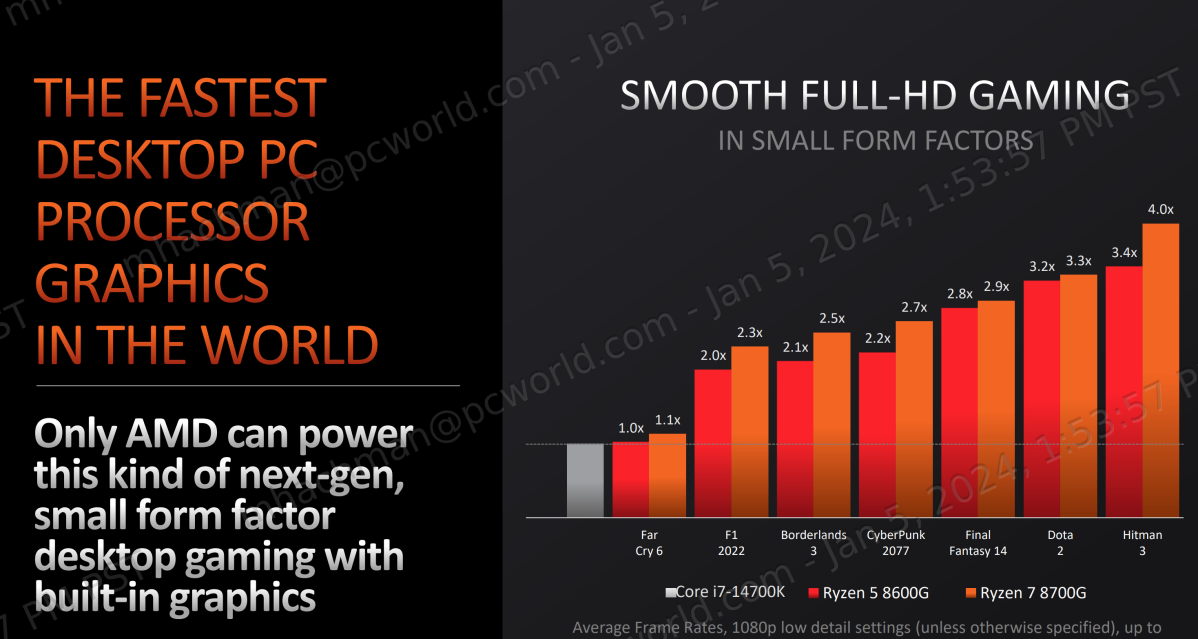
AMD
Donny Woligroski, an AMD technical manager, told reporters that the integration of the Ryzen AI NPU onto the processor saves AMD about 45 percent when running large language models, or chatbots. That translates into LLMs like Llama2’s 7-billion-parameter model running in about 4GB of the PC’s system memory. “That’s really cool,” he said.
Ryzen 5000: Preserving the AM4 legacy
The 2022 launch of the Ryzen 7000 brought the latest AM5 socket into the world, adding more expensive DDR5 memory and PCIe 5 support, too. While those added performance, they also added cost, and we praised the then five-year run of AM4 processors because of the ability for consumers to simply swap out a processor to enable an upgrade, rather than a motherboard alongside it. AMD has said before that it would stick with AM4 throughout its run of Zen 3 processors, and it’s held to that promise.
The four new Ryzen 5000 processors are an interesting mix: There’s a new X3D chip, the 5700X3D, plus the more generic Ryzen 7 5700. But there’s also two more APUs, too: the Ryzen 5600GT and the Ryzen 5500GT. The 5700X3D is the only one of the newly announced processors not to ship with a cooling solution. Here’s how they shape up.
- Ryzen 5700X3D: 8 cores/16 threads, 4.1GHz turbo, 100MB cache, 105W TDP: $249
- Ryzen 5700: 8 cores/16 threads, 4.6GHz turbo, 65W TDP: $175 (incl. AMD Wraith Spire cooler)
- Ryzen 5 5600GT: 6 cores/12 threads, 4.6GHz turbo, 65W TDP, Radeon Graphics: $140 (incl. Wraith Stealth cooler)
- Ryzen 5 5500GT: 4 cores/8 threads, 4.4GHz turbo, 65W TDP, Radeon Graphics: $125 (incl. Wraith Stealth cooler)
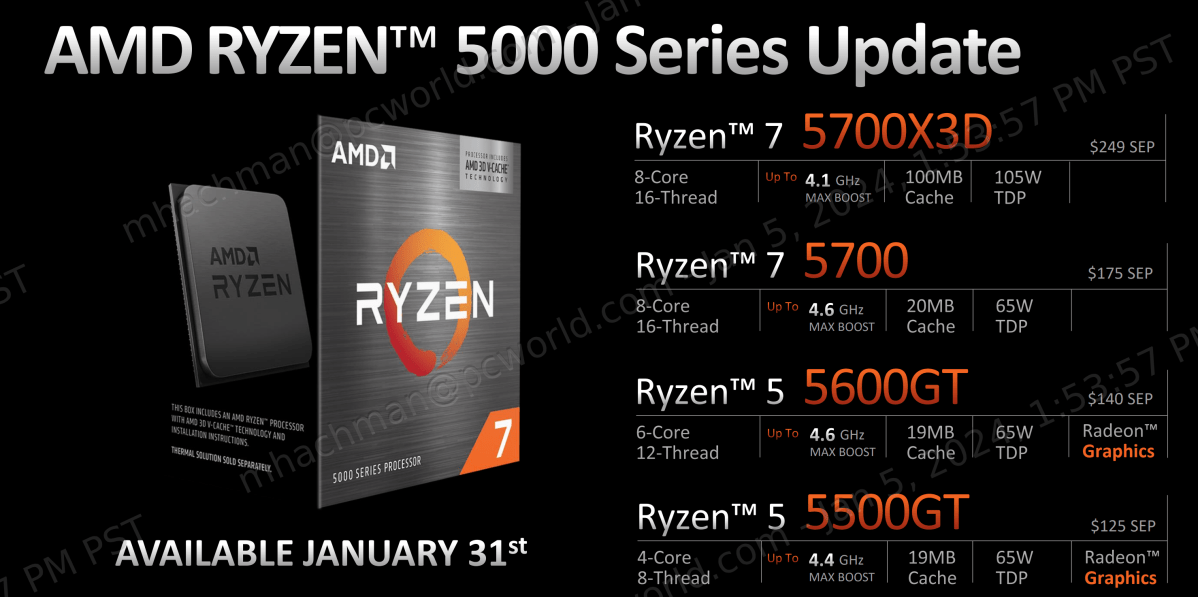
AMD
All of these new processors use the Zen 3 architecture. An AMD spokesman said via email that AMD did not have to make any changes to its supported processors and chipsets to accommodate the new processors, a strategy that it has used before.
“The AM4 platform remains a key piece of our broad portfolio of desktop processors,” the spokesman added. “The new 5000 series processors build on the unprecedented longevity of the AM4 platform. They bring even more choice for users looking to upgrade an existing PC or build a new system at a lower platform cost.”
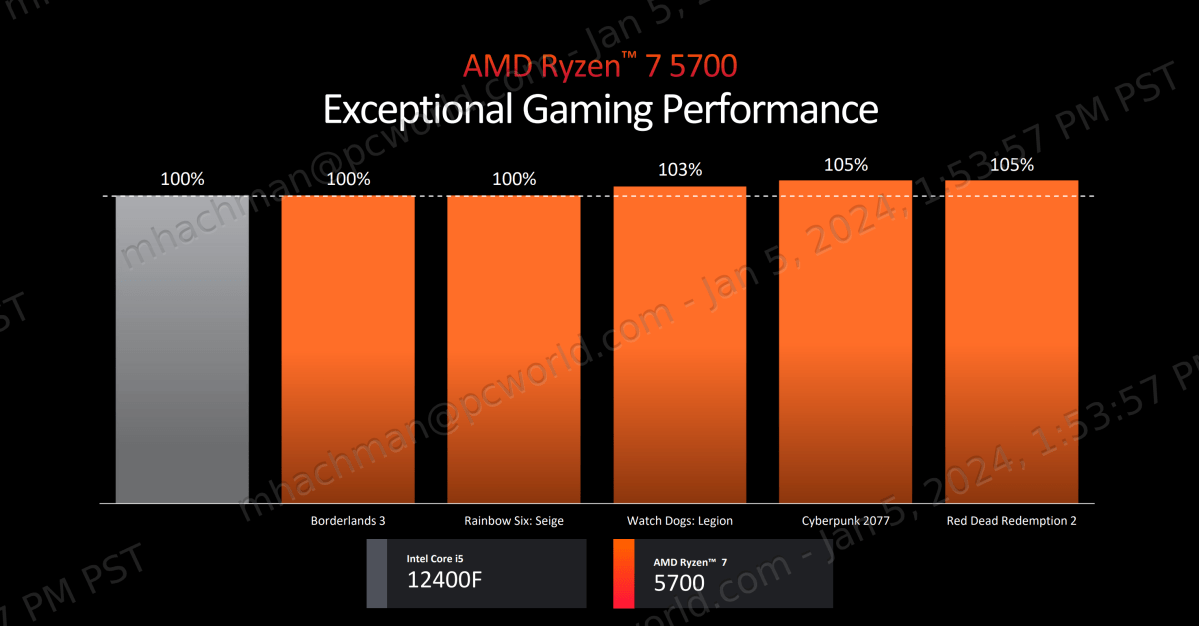
AMD
The new processors tweak AMD’s existing offerings; AMD’s Ryzen 5600G is a 6 core/12 thread chip that boosts to 4.4GHz, for example, versus the 4.6GHz boost of the 5600GT. But these are older parts, and AMD is comparing them to a 12th-gen Core as a competitor. If you want the fastest performance, you’ll have to opt for an AM5 motherboard instead.
Nevertheless, we now know more about what you’ll be buying in 2024. Will it be a new Ryzen?

